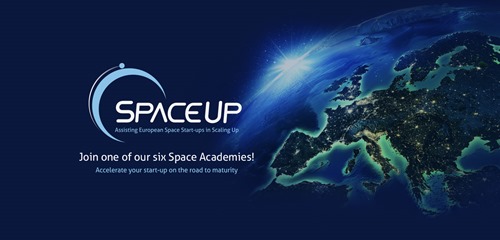Assisting European Space Start-ups in Scaling Up
/COVER-HEADER2.jpg)
Objectives
The overall objective of SpaceUp was to contribute at a European level to the safeguarding and further development of a competitive and entrepreneurial space industry.
SpaceUp planned to ease the transition of viable European space start-ups into becoming mature companies by offering them:
- Expertise
- Customised coaching services
- One-to-one modules
- Networking
- Matchmaking
The SpaceUp project had in place an international complementary consortium that was able to offer financial, administrative, and technological services such as:
- Support - SpaceUp identified high TRL startups and alumni companies and provided additional support in fundraising for acceleration
- Encourage - SpaceUp took up applications of space data and services developed in the context of EGNSS and Copernicus by incentivizing the use of these data for companies within the space sector and those outside, promoting the uses of EGNSS and Copernicus
CONSORTIUM MEMBERS
AVIASpace Bremen
EBAN - The European Trade Association for Business Angels, Seed Funds and Early Stage Market Players
Gi Group
200 - Two Hundred
Fraunhofer Gesellschaft Zur Forderung Der Angewandten Forschun Ev
IBS Consulting
Hypatia
IASP - International Association of Science Parks and Areas of Innovation
SME4SPACE
Lazio Innova
Activities
Starting from 2019, there were 6 space academies, each involving 10 startups. These 2-day events were held throughout Europe in various relevant space and business locations.
The next Space Academy was held virtually from the 16th to the 18th of June 2021 in conjunction with the EBAN Annual Congress. Applications were open for startups to receive expert services until the 11th of April 2021. Full information on the event was available on the SpaceUp website.
The selected startups received support documentation based on their business plan and needs beforehand; participated in up to six individually selected one-to-one mentoring and coaching meetings; pitched in front of a large audience, including investors, on the second day; and had their travel expenses covered, including participation in at least one networking dinner and possibly the final event.
The events were broken down as follows:
Day 1
The first day consisted of one-to-one and roundtable meetings and workshops. All entrepreneurs had the opportunity to improve their skills and gain insights from experts on various topics. The workshops focused on more general skills, though they remained intensive. The skills taught, such as investment readiness, business modeling, and intellectual property rights (IPR), were applicable to all sectors. The one-on-one meetings were more personalized, offering tailored guidance to the entrepreneurs.
Day 2
The second day followed the format of a small congress with panels, keynotes, and pitching sessions selected from the ten startups. Keynotes and panels led by field experts informed attendees about the latest trends in the space and business sectors.
These events featured experts and field leaders in many areas of space/aerospace and business, including:
- Investment readiness
- Crowdfunding
- Hot trends in artificial intelligence and robotics
- Business models
- European funding for young SMEs
- The European Space ecosystem
Consortium members
/canvascolor(0xffffffff)/MemberLogo-8568-9611.png)
/canvascolor(0xffffffff)/Logo_EBAN.png)
- Start date:01 June 2018
- End date:31 December 2021
- Reference:
- URL:
- Overall budget
- Project financing
- Project funding
- EU financing
- Research area:
- Programme:
- Challenge:
- Social medias:
/)


/canvascolor(0xffffffff)/MemberLogo-5689-6128.jpg)
/canvascolor(0xffffffff)/La_Salle_Barcelon_logo.png)
/canvascolor(0xffffffff)/2017_11_15_Slovekia_CEPIT.jpg)
/canvascolor(0xffffffff)/Korea_Innovation_Foundation.png)
/canvascolor(0xffffffff)/2024_05_08_Edmonton_Research_Park_Logo.png)
/canvascolor(0xffffffff)/Lion_scienc_park_black_trans_3.png)
/canvascolor(0xffffffff)/2024_01_09_Logo_Business_Turku_2.png)
/canvascolor(0xffffffff)/PSP_Logo-mit-Schriftzug_1.jpg)
/canvascolor(0xffffffff)/_____logo_3.png)
/canvascolor(0xffffffff)/Aj_basa_2014_color-fonsgrisE_2.png)
/canvascolor(0xffffffff)/Identificador_Visual.png)
/canvascolor(0xffffffff)/MemberLogo-66701-317301.png)
/canvascolor(0xffffffff)/2024_04_24_UK_UNIP.jpg)
/canvascolor(0xffffffff)/2025_07_14_Turkey_Antalya_Teknokent.png)
/canvascolor(0xffffffff)/2017_07_31_PITA.jpg)
/canvascolor(0xffffffff)/2017_08_04_Eindhoven.png)
/canvascolor(0xffffffff)/New_Logo_sapiens_(1)_page-0001.jpg)
/canvascolor(0xffffffff)/2022_01_26_Italy_NOI.jpg)
/canvascolor(0xffffffff)/MemberLogo-5668-6103.gif)
/canvascolor(0xffffffff)/MemberLogo-5701-6142.jpg)
/canvascolor(0xffffffff)/cc-rgb-blackFullS_2.jpg)
/canvascolor(0xffffffff)/DSP_logotyp_svart_png.png)
/canvascolor(0xffffffff)/2017_07_26_China_TusHoldings_TusPark.png)
/canvascolor(0xffffffff)/2025_10_30_UAE_Sharjah_Research_Technology_and_Innovation_Park.jpg)
/canvascolor(0xffffffff)/2023_07_27_Italy_Road_2.jpg)
